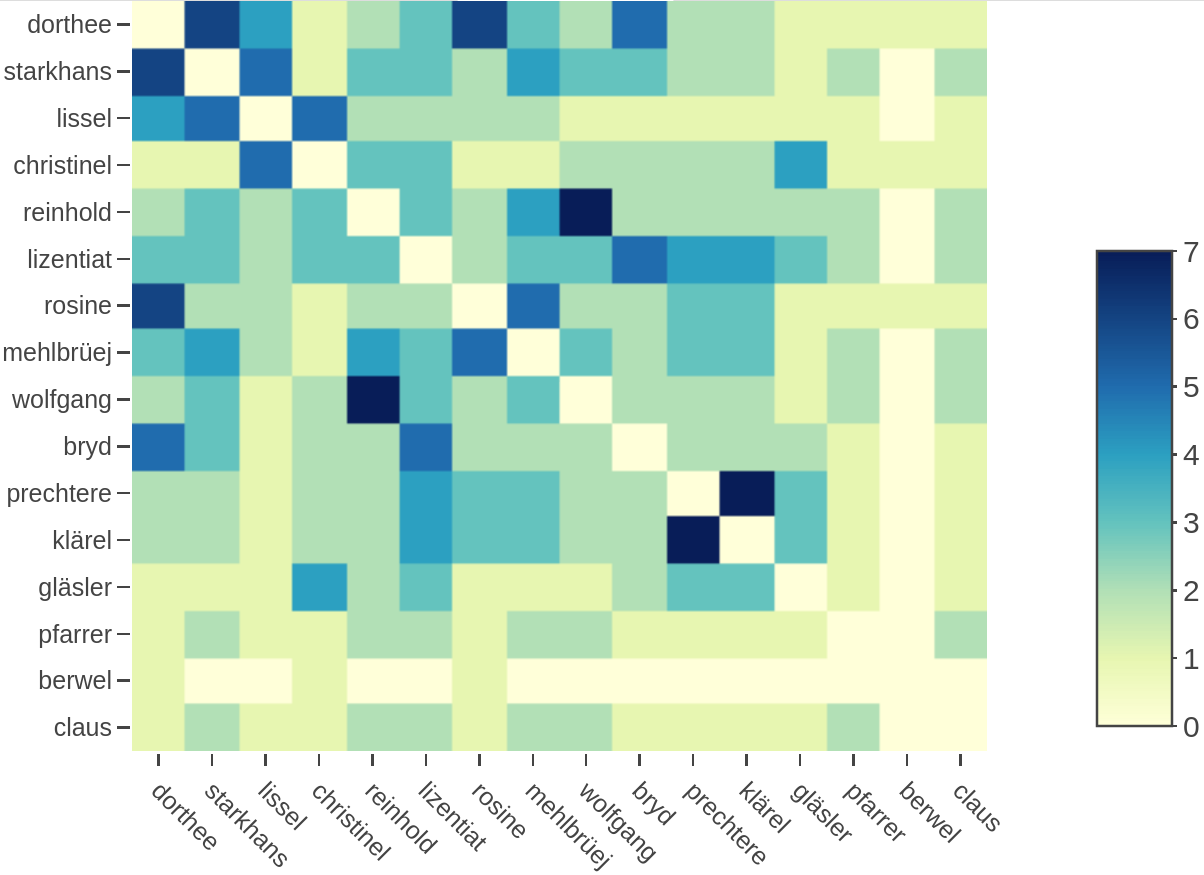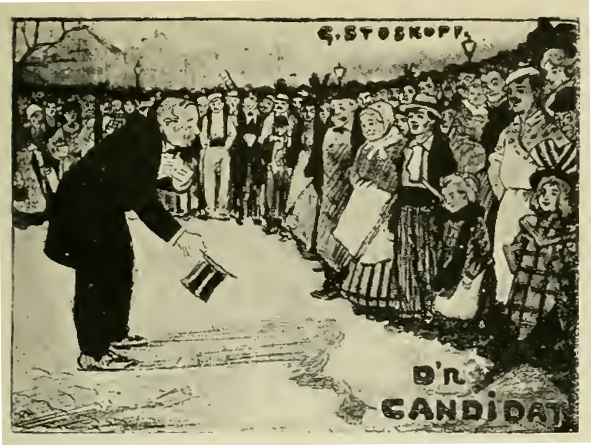Goals and challenges
The Alsatian dialect theater tradition is based predominantly on popular and humour genres. What are the major trends in this tradition, regarding dramatic technique and character types? What are its major geographic locations? To what an extent do Alsatian dialect plays document the sociolinguistic situation of the period when they were written?
In order to answer these questions and carry out quantitative analyses, a large corpus, representative of the tradition, is required, as well as corpus annotations for the relevant variables: geographical origin of plays and authors, places where the plays take place, their period and genre. Regarding the characters, attributes such as their profession, social status, origin, gender or age must be made available. It is also necessary to formalize the plays' structure, identifying act and scene divisions, characters' speech and stage directions.
Our project’s first goal is creating such a corpus, encoded in the TEI format (Text Encoding Initiative), whose Performance module covers the types of annotations we’re interested in. We’re working on a representative collection of plays, which were recently digitized by the Bibliothèque Nationale et Universitaire (Bnu) in Strasbourg. We’re currently performing OCR on the plays and their TEI encoding.
The corpus thus created will allow a distant reading or macroanalysis approach to Alsatian theater. Such approaches have been applied successfully to the major European dramatic traditions, as shown in a 2017 special issue of the Revue d’Historiographie du Théâtre. However, such analyses are still impossible for Alsatian, given lack of an appropriate digital corpus. The MeThAL projects seeks to make up for this lack of resources.
To that end, we will apply natural language processing and document representation techniques, besides web technologies which will contribute to corpus navigability.
Challenges
The huge orthographic variety of Alsatian presents specific challenges for Natural Language Processing (NLP), as is the case for any low-resource language. These challenges highlight needs which are only partially addressed by existing text analysis tools, mainly geared towards majority languages. The project will exploit and contribute to the resources created by the RESTAURE project, on NLP for France’s regional languages.
Outputs
Publications and contributions to conferences
-
Qinyue Liu, Pablo Ruiz, Delphine Bernhard. (2023). Towards emotion analysis for Alsatian theater. Poster presented at Computational Humanities Research, Paris, France. Poster: ⟨hal-04213017⟩. Abstract: ⟨zenodo.8404252⟩
-
Pablo Ruiz. (2023). The MeThAL Alsatian theater corpus and related resources: Work done and perspectives. 5èmes journées scientifiques du Groupement de Recherche Linguistique Informatique Formelle et de Terrain (LIFT) : 113-118. Nancy, France. ⟨hal-04391970⟩
-
Pablo Ruiz, Delphine Bernhard, Andrew Briand, Carole Werner. (2022). Computational drama analysis from almost zero electronic text: The case of Alsatian theater. Workshop on Computational Drama Analysis, Cologne, September 2022. [preprint]
-
Pablo Ruiz, Helena Bermúdez. (2022). Feature structures for character social variable annotation and an application to Alsatian theater. Poster accepted at TEI 2022 - Text Encoding Initiative Conference (Virtual poster session). September 2022. Newcastle, United Kingdom. ⟨10.5281/zenodo.7110069⟩ ⟨hal-036762679⟩
-
Delphine Bernhard, Pablo Ruiz. (2022). ELAL: An emotion lexicon for the analysis of Alsatian theatre plays. LREC 2022, Language Resources and Evaluation Conference. ⟨hal-03655148⟩
-
Pablo Ruiz, Carole Werner, Delphine Bernhard. (2022). The benefits of increasing the digital availability of Alsatian theater. Digital Humanities 2022 : 557-560. ⟨10.5281/zenodo.7014965⟩ ⟨hal-03660481⟩
-
Pablo Ruiz, Carole Werner. (2022). Théâtre alsacien : Personographie en TEI et navigation du corpus selon les attributs sociaux des personnages. Humanistica 2022. ⟨hal-03660506⟩
-
Pablo Ruiz, Carole Werner, Delphine Bernhard, Pascale Erhart, Dominique Huck. (2021). MeThAL : Ressources numériques pour une relecture du théâtre en alsacien. Poster presented at 10 ans avec CAHIER : Des corpus d’auteurs pour les humanités numériques à leur exploitation numérique, June 2021, Bordeaux, France. ⟨10.5281/zenodo.4908212⟩. ⟨hal-03255403⟩
-
Pablo Ruiz, Carole Werner. (2021). Exploration du théâtre alsacien à travers ses listes de personnages pendant la période 1870-1940. Humanistica 2021 : 27-29, Rennes, France. ⟨10.5281/zenodo.4762732⟩ ⟨hal-03226579⟩ [slides]
-
Pablo Ruiz, Delphine Bernhard, Carole Werner. (2020). Création d’un corpus FAIR de théâtre en alsacien et normalisation de variétés non-contemporaines. 2èmes journées scientifiques du Groupement de Recherche Linguistique Informatique Formelle et de Terrain (LIFT) : 32-43. Montrouge, France. ⟨10.5281/zenodo.4323301⟩ ⟨hal-03047152⟩ [slides]
-
Pablo Ruiz, Delphine Bernhard, Pascale Erhart, Dominique Huck, Carole Werner. (2020). MeThAL : Vers une macroanalyse du théâtre en alsacien. Humanistica 2020, Bordeaux, France. ⟨10.5281/zenodo.3788019⟩. ⟨hal-02564694⟩
Corpus
You can explore the corpus (read the plays, filter according to plays' and character attributes) at its navigation interface: https://methal.eu/ui/
As regards the TEI sources:
-
Sources are updated in the methal-sources repository as encoding progresses
-
Permanent (DOI-based) publication takes place through a collection on the Nakala platform
Besides the plays, a TEI personography was published. It describes over 2,350 characters from around 230 plays, using social variables like age, gender, professional activity or social class
Software
Presentations
-
Towards the computational analysis of a peripheral literary tradition: The case of Alsatian theater. November 2023, Institute of Contemporary History. Universidade NOVA de Lisboa, FCSH. REWIND project workshop
-
Analyze peripheral literatures — or create the resources trying. June 2023. Seminar at CiTIUS, Universidade de Santiago de Compostela
-
Réutilisation et création de données ouvertes interopérables pour l’étude du théâtre en alsacien dans le cadre du projet MeThAL. Open Access Month. October 2022, Université de Strasbourg. [video] (starting at 0:50:25)
-
De l’OCR à la TEI dans un corpus de théâtre alsacien dans le cadre du projet MeThAL. 2èmes rencontres Estrades-Eveille. September 2022, MISHA, Université de Strasbourg.
-
MeThAL: Ressources numériques pour une relecture du théâtre en alsacien. Workshop « Théâtre dialectal », May 2022, Department of German Studies, Université de Strasbourg
-
MeThAL : Vers une macroanalyse du théâtre en alsacien. FRLC Seminar (Language and Cognition Research Group), Februrary 2021, Université de Strasbourg : [slides]
-
MeThAL: Vers une macroanalyse du théâtre en alsacien. LiLPa Lab Seminar, December 2019, Université de Strasbourg : [slides]
Master’s theses
-
Yang, H. (2022). Détection de la variation graphique dans une langue non standardisée : le cas des dialectes alsaciens. Master’s thesis in Language Sciences (Language Industries option). Université Grenoble Alpes. University supervisor : Claude Ponton (UGA). Internship supervision : Pablo Ruiz Fabo (Unistra), Alice Millour (Paris 8), Delphine Bernhard (Unistra). ⟨dumas-03794680⟩
Events
-
23/06/2023 : Workshop Amateur theater and digital resources: Stabilization factors in the practice of minority language varieties? [program]
News
-
The Bnu’s research blog talks about:
-
Our work on character distribution based on the plays' dramatis personæ
-
Publication of the first 25 TEI-encoded plays
-
New project related to MeThAL! In 2023-24, we will also be working on the TheALTReS project (Comparing Theater in ALsacian with the TRaditions at its Source), supported by the MISHA as part of its scientific program.
-
The DraCor platform (Drama Corpora) has accepted to host the encoded plays, making some first analyses possible:
-
dracor.org/als: Digital edition browsing, character networks and character-relation networks
-
shiny.dracor.org: Character interaction metrics. For instance, the interaction matrix below, for characters in Der Pfingstmontag (Arnold, 1816).
-

Participants
Project participants are members of the LiLPa lab: Pablo Ruiz (lead), Delphine Bernhard, Pascale Erhart, Dominique Huck and Carole Werner.
We are also in contact with the Bnu’s Datalab and the Bnu’s special interest group on corpora (SIG Corpus).
Special thanks to the many interns that we’ve been fortunate to work with in the project, from several fields and programs (Language Technologies, Linguistics at Master’s level; Modern Languages, Computer Science at Bachelor’s level): Nathanaël Beiner, Lena Camillone, Hoda Chouaib, Audrey Deck, Valentine Jung, Salomé Klein, Audrey Li-Thiao-Té, Kévin Michoud and Vedisha Toory among University of Strasbourg students. From other schools, Andrew Briand (University of Washington via IFE Strasbourg), Barbara Hoff (University of Edinburgh) and Qinyue Liu and Heng Yang (Université Grenoble Alpes).
Get in touch
Interested in OCR and TEI encoding, language technology application to Alsatian, digital editing, Alsatian linguistics or literature? Interested in an internship about these topics?
You have questions about the project?

About this website
-
This site is maintained by Pablo Ruiz Fabo (Université de Strasbourg)
Hosting
-
The site is hosted at Université de Strasbourg
License
-
Content whose URL starts with https://methal.pages.unistra.fr is licensed under CC-BY-4.0
-
The licenses for content available on the corpus explorer interface (https://methal.eu/ui/), linked to from the present site via options Explore the corpus and Interface on the menu, are specified at https://methal.eu/ui/about
